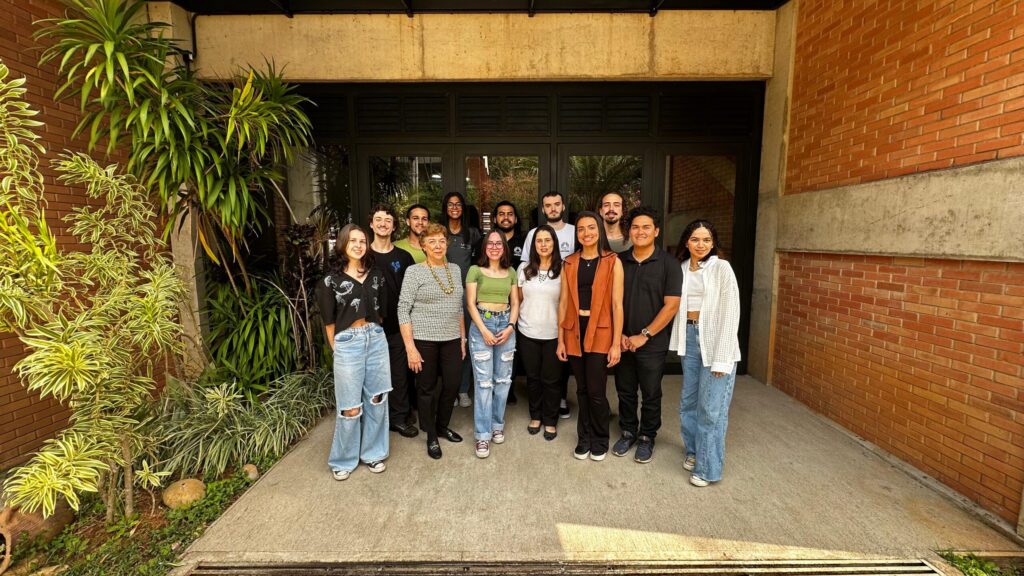One of the first mycology leagues in Brazil has been active at UFV since the end of 2022. Named LA Fungi (Academic League of Studies and Research in Mycology – LA Fungi), the league is coordinated by the advisor of the Graduate Program in Agricultural Microbiology (PPGMBA) Marliane Cássia Soares da Silva, and was created by students of the university, with the support of professor and also PPG advisor Marisa Queiroz. The group’s aim is to enhance students’ and teachers’ knowledge of Brazilian fungi. From its first meeting in September 2022 to its second anniversary, celebrated recently, the group has developed a work routine that involves weekly meetings, analyzing articles and exchanging knowledge about different types of fungus.
“We are undergraduate and postgraduate students with a common interest in deepening and sharing our knowledge of mycology. This field of study, centered on fungi in general, was little explored in the university’s existing projects, which focused predominantly on the study of fungi of interest in plant pathology,” says Iâmara Pereira dos Santos, one of the league’s founders. It was only recently, concurrently with the creation of the league, that Microbiology began to offer the subject “Biology of fungi”, created by Professor Marisa. “The general interest in fungi has been growing a lot,” adds Marliane, ”and we are dedicating ourselves to it, keeping an eye on recent publications of different profiles. This is an area in which we still have a long way to go here at UFV and we’re working on it.”
In addition to weekly meetings based on the interests of the students themselves, the league also organizes field trips and training workshops. “As far as research is concerned, at the beginning of this year we submitted a project to a call for proposals from the Minas Gerais State Research Foundation (Fapemig), with the aim of getting resources to develop some research projects with macrofungi. We are also organizing ourselves to take part in extension events, both with a focus on scientific dissemination and with the aim of providing workshops and mini-courses,” says Iâmara.
The league currently has ten students, including undergraduate, master’s and doctoral students. Romário da Silva Santana, a doctoral student at PPGMBA, is one of the young scientists who recently joined the group. He highlights the constant opportunity to learn, including from fellow undergraduates. “Seeing the interest of the undergraduates motivates me to have a more solid base for my doctorate. They are very competent at what they do, I always learn from their seminars, and being part of the league is of great personal and professional value to me.”
Coordinator Marliane says that she also learns from the league’s routine activities, and highlights the important role that the group has been playing in attracting new talents interested in mycology. “We’re having the opportunity to debate, to discuss new fungi, new subjects. I work with very specific fungi, so I also need to learn. We’re getting richer together, and this movement has attracted more students to do internships here,” she says, who works with the production and enrichment of edible mushrooms with minerals in the Mycorrhizal Associations Laboratory.
Legacy
“There are still few leagues working with mycology in Brazil, but I believe that this is a reality that will change in a few years. LA Fungi works with scientific dissemination, and with this we hope to inspire other people who have the same appreciation for fungi,” says Iâmara, who after two years of work structuring the league, is leaving the group. “I’ve always thought of leaving the league as a legacy for the university, so that in 20 years’ time or more it will still exist, even without the presence of its founders. And for that, officially registering it was a very important step. Leagues are the gateway to many future professionals, they are a very important driving force for the development of these students. What’s more, the leagues fill in gaps that undergraduate courses don’t reach, such as inserting students into the market, either in their academic careers or in the job market itself.”


Leave A Comment